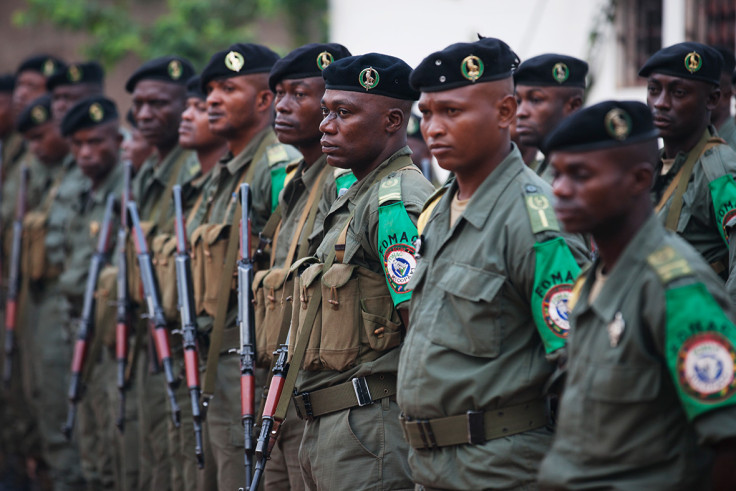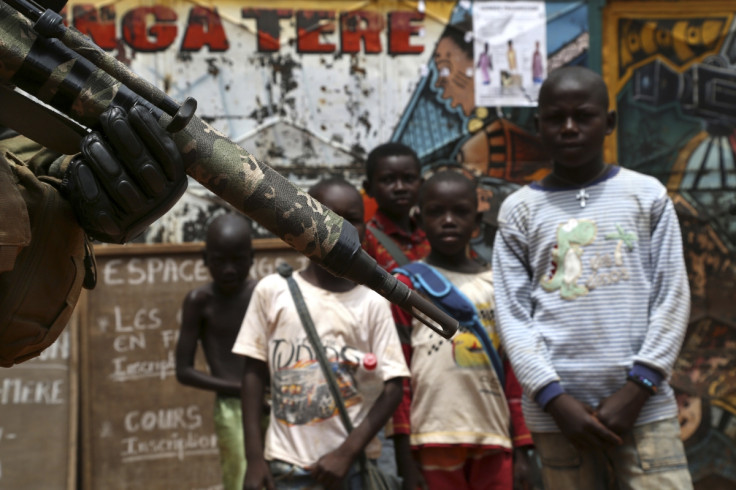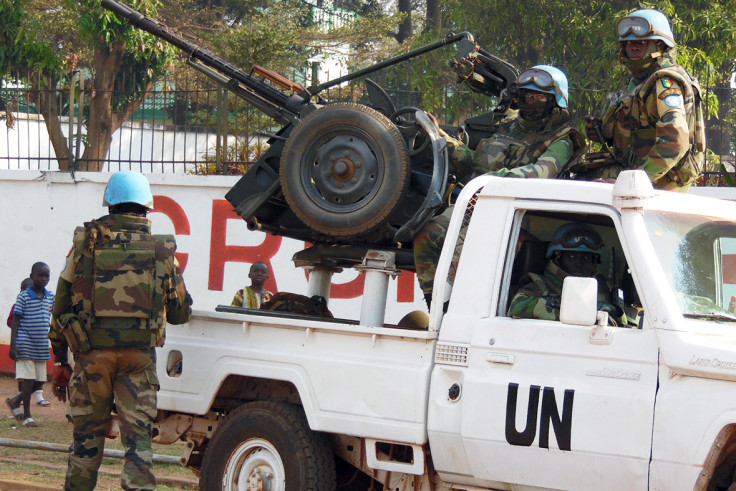Congolese peacekeepers got away with murdering 18 people in Central African Republic says HRW

Congolese peacekeepers have got away with murder after having killed at least 18 people during a mission in the Central African Republic (CAR), Human Rights Watch (HRW) has claimed.
Soldiers from the Republic of Congo killed at least 18 people, including women and children, between December 2013 and June 2015 while serving as peacekeepers in the African Union (AU) peacekeeping mission in CAR, known as Misca, and in the United Nations (UN) peacekeeping mission, known as Minusca.
The former French colony was gripped by sectarian violence when the mostly Muslim Seleka rebels ousted the government of then-President Francois Bozizé in March 2013. Following the coup, the mainly Christian anti-balaka militia organised the fight against the Seleka and carried out large-scale reprisal attacks against Muslim civilians.
Summary executions of 12 civilians including a baby
Following claims of enforced disappearances in Boali, a local non-governmental organisation exhumed a mass grave on grounds that has been used as a Minusca-peacekeeping base since 2013.
Twelve badly decomposed bodies were exhumed in February 2016, about 500 meters from the base. Their clothing and other distinctive items, such as anti-balaka amulets, identified the victims as a group of 12 people the Congolese peacekeepers detained in March 2014. They were arrested following a violent incident between Congolese peacekeepers and a local anti-balaka leader, the self-styled "General" Maurice Konoumo, in which one peacekeeper died.
Angered by the death of their colleague, the peacekeepers surrounded Konoumo's house, arrested him and at least 12 others, including five women, one of whom was six months pregnant, and two children: one about 10 years old and the other 7 months old. Those arrested subsequently disappeared.
Witnesses told HRW that the detainees were taken to the peacekeeping base at about 7pm, while peacekeepers ordered civilians who lived at or near the base to go inside their homes.
"They came and yelled at us: 'Go into your homes and lock the doors. Do not come out.' They were very angry. It was the first and only time they had made us lock ourselves into our homes like that − it was not normal," a witness said, recalling the events.
Later that night, witnesses claim to have heard screams and a volley of gunshots from an area near the villa. Another round of gunfire was heard about an hour later. One witness said he overheard an animated debate among the Congolese peacekeepers between the two rounds of shooting about whether to kill the women and children.
The following day, witnesses said they saw traces of blood at various locations at the base. Peacekeepers then declared an area about 500 meters from the villa off-limits. Residents said they believed the grounds were where the peacekeepers had buried the victims, after they were ordered not to cultivate there or cut the grass, under the pretence that the area had been mined.

Exhumation of Boali mass grave
While HRW informed both UN and government authorities of the presumed location of a grave - which was seen on satellite imagery. AU peacekeepers, UN peacekeepers, and national authorities made no effort to protect the site, or to conduct a forensic exhumation to preserve evidence for future judicial proceedings.
The February exhumation, which took place in the presence of local authorities, including a representative of the national police, refute peacekeepers' earlier claim that the victims had escaped. No forensic experts were present.
What is the UN peacekeepers' role?
UN peacekeepers (Minusca) are mandated to provide "specific protection" to women and children affected by the conflict.
This includes preventing sexual violence and to assist in holding those responsible to account.
At least 1,860 police and military peacekeepers are based in Bangui, with a minimum of an additional 800 in reserve.
The peacekeeping mission also has several advisers dedicated to monitoring, investigating and documenting conflict-related sexual violence.
An individual who took part in the exhumation said: "We first found gris-gris (traditional amulets associated with the anti-balaka), then some clothes and then the bodies."
"The discovery of 12 bodies is damning evidence of an appalling crime by Congolese peacekeepers, who had been sent to protect people, not prey on them," Lewis Mudge, Africa researcher at HRW, said.
One of Konomou's relatives told the rights group he has "not forgotten what has happened. We want the Misca soldiers to face justice. The people who are dead could have helped their families had they not been killed.
"We want a real investigation done, we are not satisfied with the investigation thus far. It is like the Central African Republic is nothing to the African Union. I sometimes think: "What if justice could be done? What would it look like if a real investigation was done?"
Peacekeepers forced crowd to watch execution
Simply rotating troops out of the Central African Republic with no further consequences sends the message that peacekeepers can get away with murder. No peacekeeper should be above the law.
Additionally, the rights group also probed the death by torture of two anti-balaka Christian militias leaders in Bossangoa in December 2013 following the brutal lynching of a Congolese peacekeeper the same day.
Shockingly, the torture and ensuing killing of the fighters was witnessed by many local UN staff members and aid workers who were staying at the Misca base at the time for their safety, HRW said.
"Locked in a staff room during the incident, the UN staff and aid workers overheard the Congolese peacekeepers torturing the two men throughout the night. Their mutilated bodies were found the next day and seen by many witnesses, who confirmed that the two men suffered extensive burns and saw evidence that burning melting plastic had been dripped on their bodies," the rights group said in its report.
Two months later in February 2014, Congolese peacekeepers in Mambéré executed two anti-balaka fighters whose hands were tied behind their backs, in front of a crowd of around 200 onlookers.
One witness, who watched the executions, said: "All of the people were curious to see them. They (peacekeepers) forced the men to lay down on the ground. The Misca commander took one of his soldier's guns and he killed them...We were all shocked by what we saw. I had never seen someone killed like that."
Another witness said the soldiers encouraged people to watch the public execution. "The peacekeepers forced the two men out of their truck, made them lie down on the ground, and then shot them in the head and chest."
After the execution, the peacekeepers forced local residents to bury the bodies in a cemetery saying: "If you do not bury these bodies right now, we will kill three times as many people."
In another violent incident in June 2015, Congolese "Minusca in military uniforms with their blue helmets" based in Mambéré detained and beat four men because of a dispute about a woman between a peacekeeper and one of the victims. Two later died from their injuries. The day after one of the victim's death, Minusca flew the two survivors to Bangui, the capital and took them by Minusca ambulance to a local hospital. Local authorities gave each one 50,000 Central African CFA Franc (approximately £60, $85).
HRW said it "found no information to corroborate that the men had been involved in criminal activities, as Minusca alleged in a news release on 10 June," when it described the men as thieves.

Governments and world bodies need to take responsibility
HRW said it is not aware that any soldier has been held to account for the killings and serious beatings. No government has taken any action towards credible investigations or justice for these crimes.
Under the status of mission agreement between the Central African government and the AU, troop-contributing countries are responsible for holding to account members of their forces for any crimes committed in the Central African Republic.
Following the exhumation of the Boali grave, HRW wrote to President Denis Sassou Nguesso of the Republic of Congo and to the AU authorities under whose auspices the peacekeeping mission was deployed, urging credible investigations to bring those responsible to justice.
A Misca force commander temporarily suspended the commanding officers from Boali and Bossangoa, Captain Abena and Captain Mokongo, and men under their command were redeployed to other parts of the country. Twenty Congolese peacekeepers from the unit in Mambéré were repatriated after the killings.
World bodies have remained just as silent. Minusca investigated the incident in 2015 and sent the results to the government of the Republic of Congo via a diplomatic note. However, there has been no response, HRW claimed.
In April 2016 Minusca opened an internal investigation.
"Republic of Congo authorities shouldn't turn a blind eye to the mounting evidence that their soldiers committed murder in Boali and elsewhere," Mudge said. "Simply rotating troops out of the Central African Republic with no further consequences sends the message that peacekeepers can get away with murder. No peacekeeper should be above the law."
Earlier this month, France suspended five members of the military for violence during their deployment in Central African Republic against citizens they were sent to protect. The nature of the violence is unclear, and the Defence Ministry said it was not linked to the allegations of sexual abuse of children in CAR by French soldiers in an operation to help stabilise the African nation, which are still under investigation.
© Copyright IBTimes 2025. All rights reserved.






















